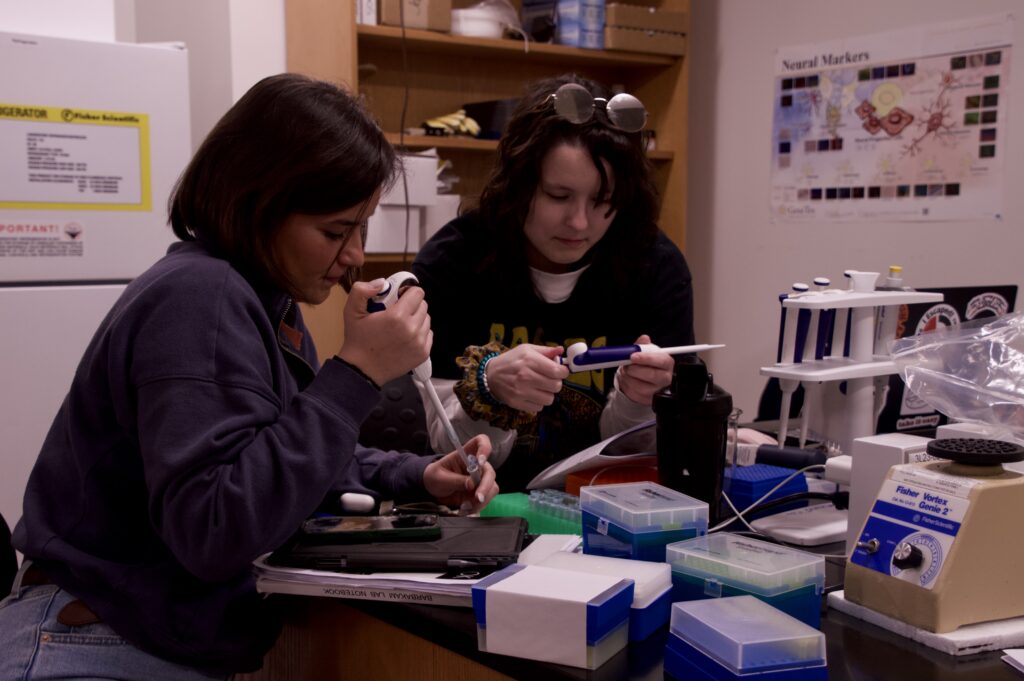$30 million donation benefits STEM departments
3 min read
Class of 1959 alumna Irene Piscopo Rodgers has gifted UMW a $30 million donation specifically to benefit the university’s science, technology, engineering and math programs. The donation, coming from Rodgers’ estate in Huntington, N.Y., after her death on July 18, 2022, is the largest gift ever given to the university and will carry on her legacy as a leader in the field of electron microscopy. | Abbey Magnet, The Weekly Ringer
by MADISON MCCALLUM
Staff Writer
Class of 1959 alumna Irene Piscopo Rodgers has gifted UMW a $30 million donation specifically to benefit the university’s science, technology, engineering and math programs. The donation, coming from Rodgers’ estate in Huntington, N.Y., after her death on July 18, 2022, is the largest gift ever given to the university and will carry on her legacy as a leader in the field of electron microscopy.
The donation will be put directly into the university’s STEM departments: biology, chemistry, physics, Earth and environmental sciences, computer science and math. Students in these fields will have more opportunities for individual research projects working alongside faculty members, both during the school year and during the Summer Science Institute, a 10-week science research program that provides participating students with room, board and a stipend.
The donation will also create four additional Alvey Scholarships, which provide out-of-state undergraduate students with full tuition, fees and room and board for up to four years.
“This will help many students who are struggling to pay for school,” said junior mathematics major Emma Schieda. “These are great opportunities for people who live out of state because I know there is a significant difference in the in-state rates versus out-of-state tuition.”
Preference for Alvey Scholarships is given to students who intend to pursue STEM fields and performed well in such classes in high school. The scholarship also prioritizes female students “to encourage them to pursue STEM fields where they have been historically underrepresented,” according to UMW’s website on full-ride scholarships.
“I think those scholarships would be really beneficial to incoming students,” junior biology major Grace Williams said of Alvey Scholarships. “Qualifying for a scholarship like that would require a very high grade point average and competitive college resume, but I think a decent number of students here already had that coming into the university, despite the high acceptance rate.”
The donation makes UMW one of the most funded undergraduate research institutions in Virginia, as well as a notably well-funded institution in the country, according to Executive Director of University Communications Amy Jessee.
Graduating from Mary Washington College in 1959, Rodgers earned her bachelor’s degree in chemistry and went on to receive her master’s degree from the University of Michigan. Following her studies, she worked as a chemist and microscopist for the American Cyanamid Company and as an electron microscopist at Philips Electronic Instruments. After marrying James D. Rodgers in 1969, she served as an independent consultant to FEI, a premier provider of electron and ion-beam microscopes and tools for nanoscale applications, according to her obituary.
From her first donation of $50 in 1980, Rodgers gifted the university nearly $39 million over her lifetime. Through Rodgers’ donations, 85 UMW students have received various awards, according to the university’s press release. After gifting the university a transmission electron microscope in 2004, she even trained faculty and students how to use it. In 2014, the university recognized Rodgers with an honorary doctorate of humane letters, an honorary degree for those who have made humanitarian and philanthropic contributions, according to her obituary.
Students in STEM fields were pleased to hear of the recent donation and are hopeful that it will bring improvements in their areas of study.
“The money could go to new classes, more samples and new lab technology,” said freshman environmental science major Ned Mangum. “As an environmental science major who is interested in water resources and energy, more classes in the subject specifically, as well as more research opportunities would be ideal.”
Although the Jepson Science Center, built in 1998, recently underwent renovations and upgrades, James Farmer Hall, the mathematics and computer science building, was built in 1940 with an addition completed in 1960. Some students with classes in James Farmer Hall hope that the building will receive updates as well.
“Within the STEM program, I think the donation should go toward improvements in the math building,” said Schieda. “The building is very old and could use a lot of updates.”
Rodgers’ impact will be felt by students for years to come.
“These STEM scholarships are great,” said Mangum. “A lot of people don’t have the money for STEM, and making it affordable is helpful to helping those who can’t normally study it.”


